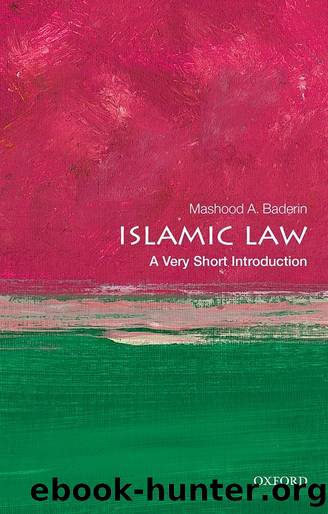Islamic Law: A Very Short Introduction by Mashood A. Baderin

Author:Mashood A. Baderin [Baderin, Mashood A.]
Language: eng
Format: epub
ISBN: 9780191643552
Google: AeAeEAAAQBAJ
Publisher: Oxford University Press
Published: 2021-02-25T00:00:00+00:00
Child custody and guardianship
On dissolution of marriage the mother has a superior right to custody (haá¸Änah) of an infant child, on the presumption that this will serve the best interest of the child, while the fatherâs duty of guardianship (wilÄyah), including provision of maintenance for the child, subsists after divorce. This is deduced from Q2:233ââMothers shall suckle their children for two whole years for those who desire to complete the suckling term; and the father of the child shall bear provisions for their feeding and clothing equitably.â There are also many ahÄdÄ«th that serve as authority for the different aspects of haá¸Änah. For example, al-MarghinÄnÄ« states in his al-hidÄyah that âIf separation occurs between the parties, then the mother has a superior right to the custody of the child, due to the report that a woman said: âO Prophet! This child of mine, for him my belly is like a cradle, my lap like a tent, and my breast like a beaker, but now his father wants to separate him from meâ. The Prophet said to her: âYou have a superior right to him, as long as you do not marryâ ⦠Accordingly there is greater justice in giving the child to the mother.â
It is also reported in another hadÄ«th that a woman came to the Prophet and said: âMy husband wants to take away my son, although he [my son] gives me comfort and brings me drinking water from the well.â Her husband contested her claim over the child. The Prophet gave the child an option saying, âO child, this is your father and this is your mother, make a choice of whomever you want between the two of them.â The son took the hand of the mother and she went away with him (AbÅ« DÄwud).
There is consensus amongst Islamic jurists that the mother has the primary and superior right to the custody of her child, which consists of the duty to physically take care of the child. And the father has the right and duty of guardianship which consists of the right to monitor the child and duty to provide for his maintenance. However, there are differences of juristic opinion regarding the age of the child at which the right to physical custody may revert to the father. Although the mother is listed as having the primary right of custody of the child, the jurists acknowledge, as stated by al-MarghinÄnÄ« in al-hidÄyah, that she is not to be forced to undertake custody where it is obvious that she is unable to care for or bring up the child. In such cases, the classical jurisprudential manuals provide rules on the hierarchy of persons entitled to custody in the absence of the mother, most of which prioritize the childâs maternal relatives.
Protecting the best interest of the child is the guiding principle on the rules of child custody in Islamic law. Thus, Ibn QudÄmah stated in al-mughnÄ« that the principles of custody have been introduced for the welfare of children. Thus,
Download
This site does not store any files on its server. We only index and link to content provided by other sites. Please contact the content providers to delete copyright contents if any and email us, we'll remove relevant links or contents immediately.
| Africa | Americas |
| Arctic & Antarctica | Asia |
| Australia & Oceania | Europe |
| Middle East | Russia |
| United States | World |
| Ancient Civilizations | Military |
| Historical Study & Educational Resources |
Machine Learning at Scale with H2O by Gregory Keys | David Whiting(4290)
Never by Ken Follett(3931)
Fairy Tale by Stephen King(3367)
Oathbringer (The Stormlight Archive, Book 3) by Brandon Sanderson(3132)
The Man Who Died Twice by Richard Osman(3068)
Will by Will Smith(2904)
Rationality by Steven Pinker(2349)
Can't Hurt Me: Master Your Mind and Defy the Odds - Clean Edition by David Goggins(2319)
The Dark Hours by Michael Connelly(2299)
Friends, Lovers, and the Big Terrible Thing by Matthew Perry(2214)
The Dawn of Everything: A New History of Humanity by David Graeber & David Wengrow(2187)
Principles for Dealing With the Changing World Order: Why Nations Succeed and Fail by Ray Dalio(2034)
A Short History of War by Jeremy Black(1841)
HBR's 10 Must Reads 2022 by Harvard Business Review(1832)
Go Tell the Bees That I Am Gone by Diana Gabaldon(1746)
A Game of Thrones (The Illustrated Edition) by George R. R. Martin(1710)
Kingdom of Ash by Maas Sarah J(1662)
515945210 by Unknown(1660)
443319537 by Unknown(1542)
